On May 31, we commemorate the first death anniversary of Fr. Joseph M. de Torre, UA&P’s first University Professor of Social and Political Philosophy.
The Internet can tell you the basics about the life of this great teacher of philosophy: He was born José María Callejas de Torre in Madrid on May 25, 1932. He obtained a Bachelor of Arts degree from the University of Barcelona and a Master of Arts degree from the Angelicum (Rome), where he also did his doctorate in Philosophy. He was ordained priest of the Prelature of Opus Dei in 1955 and spent the next 13 years teaching and doing pastoral work in Ireland and England. In 1968, he came to the Philippines. Beginning 1970, he taught social ethics, social economics, and modern philosophy at the Center for Research and Communication (CRC, now UA&P). He headed the Department of Philosophy at the CRC College of Arts and Sciences from 1989 to 1994. His book Christian Philosophy has been widely used as a reference text in universities here and abroad. He died on May 31, 2018 after suffering from debilitating musculo-skeletal problems, macular degeneration, and pneumonia.
But how was he as a young man? How did he spend his summers? How did he fare in his studies? How did he know what God was calling him to?
These we will have a glimpse of from Fr. de Torre’s own telling. His manuscript “My Encounters with St. Josemaría Escrivá and His Successor the Servant of God, Alvaro del Portillo, and How They Led Me in My Vocation in Opus Dei” is a rich source of his personal encounters with the founder of Opus Dei and its first prelate. Though this unpublished account centers on these encounters, its first few pages offer a bird’s eye view of his student years in Barcelona, enough to know what consumed his youth. Following are excerpts from this period in Fr. de Torre’s life.
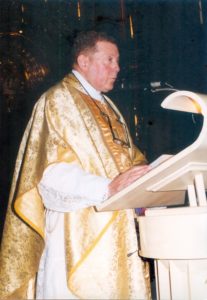
My father, José Maria Torre Aguirre-Sarasúa, belonged to a well-to-do large family of Bilbao. He neglected his studies. Fond of sports and the easy life, he became a professional footballer for some years in Bilbao until he decided to become a professional theater-actor and joined a Mexican touring company. There he met my mother, Pilar Callejas Ocio, with whom he contracted canonical marriage in Madrid in 1923, under the guidance of my father’s devout mother, Doña Elvira Aguirre-Sarasúa Aspiazu. My mother, born in Logroño, lost her mother at birth, and her widowed father brought her up with very little education, until one day, a touring Catalan theater company offered my grandfather, Gabriel Callaja, to adopt the twelve-year-old Pilar. And this is how she eventually met my father and married him.
In those years, my father (estranged from his father, a liberal anti-clerical, and from his mother, a devout Catholic), while working as an actor got passionately involved with the leftist anti-monarchist and anti-clerical movement, and eventually joined the Federación Anarquista Ibérica (FAI) and the anarchist labor union Confederación Nacional del Trabajo (CNT). At the end of the 20s, my parents (still childless) were on a theatrical tour in South America.
In April 1931, King Alfonso XIII left Spain and the Spanish Second Republic was proclaimed with a very strong leftist influence; there were burning of churches and convents and anti-clerical riots. Father Escrivá, who had founded Opus Dei in 1928, now witnessed those dramatic events.
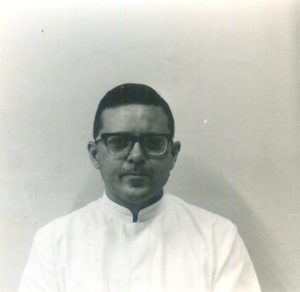
My father then decided to cut short his theatrical tour and left Colombia for Spain with my pregnant mother, who gave birth to her first born, José María Jr., in Madrid on May 25, 1932. In September 1935, the second child was born, Rosario.
The Civil War broke out on July 18, 1936, and Spain was divided into two zones depending on the prevailing powers of those forces. Madrid was with the leftist Republic and so was Barcelona, a stronghold of the anarchists. The latter became notorious as chief killers of bishops, priests, seminarians, and religious. My father, despite being an anarchist, refused to go along with these killings and found employment in the Autonomous Government of Catalonia. From Madrid, therefore, we transferred to Barcelona at the end of 1936. My little sister and I grew up in anarchist Barcelona and joined an anarchist pre-school.
The war ended on April 1, 1939, and the new Spanish government under General Franco engaged in a rash repression of all leftist groups like Masons, socialists, communists, and anarchists, allegedly charged with war crimes. My father was free of charges and so was left in peace. While my mother continued in the theater, my father engaged in the dubbing of films, and that was my first exposure to English. My father took sides with the Allies in the ensuing Second World War.
By 1944, I had finished my elementary school and began my secondary school at the Milá Instituto. On reaching the fourth year in 1947, through the influence of my father, a lover of music (and of freedom as a good anarchist), I joined the Barcelona Conservatory of Music concurrent with my high school studies. At this time, my father fell sick with tuberculosis and various other ailments. He was only 52 and, on his deathbed, he was giving signs of a return to his childhood Faith. He died on December 27, 1947. I therefore interrupted my studies at the Conservatory, and had to join my mother in the theater and continue my dubbing of movies to get some more income. In 1948 and 1949, I consolidated my position as valedictorian in the Milá, and continued more and more interested in religion, especially through the influence of two very good professors of philosophy.
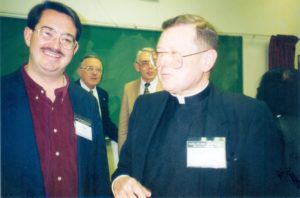
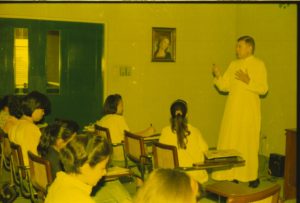
In 1950 (a Holy Year), I made a retreat with Fr. Arcusa. This was a most important turning point in my life: a profound and passionate conversion to Christ. I had a long conversation and a general confession with Fr. Arcusa. At the end, this holy Jesuit asked me: “How old are you, Jose María?” I answered: “18 years old.” “As penance then,” he said, “recite 18 Hail Mary’s, kneeling down in front of the Crucifix, with arms outstretched like a cross.” I then gave myself totally and irrevocably to Christ (a decision I have never—thank God—taken back henceforward). Then, I requested Fr. Arcusa to allow me to enter the Society of Jesus, and he answered me to pray for it and to finish first my college studies. He recommended [to] me a spiritual director for the meantime, namely an Oratorian priest living near my school, by the name of Fr. Alemany.
It was at this time before the end of the academic year in June, that a classmate of mine showed me a book and invited me to read it. It was Camino by José Maria Escrivá. “Do you know this author?” “No,” I said.
I took it home and started reading it. I could not put it down. This was another turning point in my life. This classmate, who was not connected with Opus Dei, showed me another book that shook me up as well. The title was El valor divino de lo humano (later translated into English as Man the Saint), and the author was a young lawyer named Jesús Urteaga. In the introduction, he wrote, “Whatever good you find in this book comes from Escrivá, and the rest is mine.” I was thrilled with the way human virtues were here related to the supernatural life. I spent that summer with activities in the parish and joined a chess club (of which I was very fond). Because of my growing interest in philosophy, I was very impressed with Pius XII’s encyclical Humani Generis, published at that time, in which the Pope dealt with modern philosophical issues, like existentialism and evolutionism.
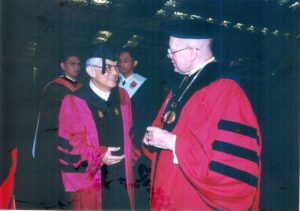
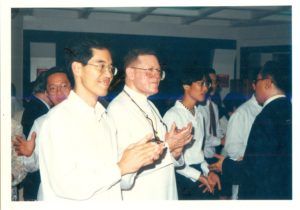
One day at the beginning of the academic year in October 1950, an alumnus of the Milá, now taking up the masteral program of philosophy at the University of Barcelona, visited our Instituto and enquired from Fr. Lasheras who the present valedictorian was. When I was introduced to him, he asked me, “Have you heard about Opus Dei?” I said, “Is it related to José Maria Escrivá?” “Correct,” he said, and he went on, “I am a member, and would like to invite you to a Center of Opus Dei for university students a few kilometers from here, the Residencia Monterols.” This residence hall for about 45 students had been recently opened.
At the entrance of the Residencia, I was met by Pedro Plans and then Jaime Termes joined us, both of them college teachers. Full of cordial serenity and friendliness, they accompanied me to the oratory for about 100 persons, austere but tasteful, dedicated to Our Lady of Montserrat, Patroness of Catalonia. From there, we went to a spacious study room with the inscription of the New Commandment hanging discreetly on the wall. I was impressed by the silence. “Do you have times for relaxation?” I asked. “Of course, in the living room, but they are scheduled.” “Would you like to visit the chaplain of the residence?” We went upstairs and knocked on the door. The chaplain stood up smiling to welcome me. His name was D. Justo Martí, a former mayor of a Valencia town. We sat down for a cordial and spontaneous conversation. He asked me about my studies and background. I told him candidly about my contact with the Jesuits and my desire to join them after finishing my bachelor’s degree, and had started my spiritual direction with Fr. Alemany, the Oratorian priest near my school. He warmly agreed with my plan and was full of praises for both the Jesuits and the Oratorians. “You can visit me any time, and I will pray for you,” he said with a smile.
They invited me to join the means of formation offered to all the students voluntarily: study circles, weekly meditations, visits to the poor of Our Lady, catechism teaching, excursions, recollections, retreats, spiritual direction, etc. I attended many of them, but continued my spiritual direction with Fr. Alemany, who appreciated Opus Dei.
During Holy Week, I made my retreat with Fr. Arcusa again, now much more serene. I told the Jesuit about my “discovery” of Opus Dei, but assured him that my plan to join the Jesuits was still standing. He told me to make sure to do God’s will.
On April 21, I attended the usual Saturday meditation with Benediction and Salve. Before leaving, one of the directors of Monterols wanted to talk with me. We set an appointment for the following morning. He went straight to the point: “Would you be willing to join Opus Dei with a total and complete availability to the Work of God?” I told him that my original idea had been to give myself to Christ as a Jesuit, but since meeting Opus Dei, I had been more and more inclined to it. He then told me to kindly go to the Oratory to ponder on it. [I read] Acts 20:17 and 18, when Paul addresses the bishops from Ephesus at Miletus, and after warning them on the impending errors and schisms promoted by the devil, he exhorts them to shepherd their flocks for the Church of God. Then Paul, on his way to Jerusalem, perhaps never to return, reminds them of his complete dedication to the Gospel free of charge, supporting himself and his companions. And he concludes (verse 35): In everything I did show you that by this kind of hard work, we must help the weak, remembering the words the Lord Jesus said: It is more blessed to give than to receive. The text goes on to describe the emotional farewell given to Paul on his way to Jerusalem.
At this point, I saw the “light,” went out of the oratory, and manifested with full conviction and freedom my decision to give myself to Christ in Opus Dei. I was brought to the Director, Juan Cabello, and after a brief conversation, I sat down at his desk to write my letter to the Father asking for admission as a Numerary member. It was Sunday, April 22, 1951, the 10th anniversary of the death of Doña Dolores, our Founder’s mother, so relevant to the history of the Work.
The following day I went back to school, now nearing the Bachelor’s final exam at the University, which I passed in June.
Father Lasheras was very happy with my decision, telling me that I had made Christian perfection the goal of my life. Both Fr. Arcusa and Fr. Alemany received the news with exemplary spirit. But the ones most excited were my aunt Pilar and my uncle José from Bilbao. The former had told me that in the Santander enclosed convent, they were very regularly using the works of Escrivá, and astonished at his “contemplative life in the middle of the world.”
My mother and my teenage younger sister were a harder nut to crack. They were engaged in theatrical tours and hoped that I could be the “head of the family” after studying an Engineering course. When I told my mother that I had to attend a course of formation in August near Madrid (Molinoviejo), she told me that she could not afford the expenses. So I got help from my uncle José. Later, on my way to Molinoviejo, I visited him in Bilbao and my Carmelite aunt in Santander. I also had an unforgettable chat and confession with D. Amadeo de Fuenmayor, recently ordained.#
Leave a Reply